class: center, middle, inverse, title-slide # Dirty Wars ## Lecture 10: Torture ### Jack McDonald ### 2019-11-28 --- class: inverse # Theory Discussion Question .question[ Can you define a particular element of torture that you find more disturbing than others? ] ??? --- class: inverse # Lecture Outline .pull-left[ Key common practices of dirty wars (e.g. the use of torture) demonstrate the importance of examining the normative dimension of war and repression at the institutional level. ] .pull-right[ - Torture - The Ticking Time Bomb - Modern Torture Debates ] ??? --- # Line of Argument Torture practices and debates demonstrate many of the aspects of dirty wars that we have discussed this term Explaining how, and why, organisations resort to torture is relevant to almost every discussion we have had so far Examining attitudes towards torture, and "torture-lite" is a way of understanding cultural attitudes towards war and political violence ??? --- class: inverse # Part 1: Torture ??? --- # Defining Torture .pull-left[ .small[ > No one shall be subjected to torture or to cruel, inhuman or degrading treatment or punishment. Universal Declaration of Human Rights, Article 5 > No physical or mental torture, nor any other form of coercion, may be inflicted on prisoners of war to secure from them information of any kind whatever. Geneva Convention III, Article 17 > No one shall be subjected to torture or to cruel, inhuman or degrading treatment or punishment. International Covenant on Civil and Political Rights, Article 7 ] ] .pull-right[ .small[ > the term "torture" means any act by which severe pain or suffering, whether physical or mental, is intentionally inflicted on a person... when such pain or suffering is inflicted by or at the instigation of or with the consent or acquiescence of a public official or other person acting in an official capacity. Convention Against Torture, Article 1 > Prohibition of torture: No one shall be subjected to torture or to inhuman or degrading treatment or punishment. European Convention on Human Rights, Article 3 ] ] ??? Full definitions: Universal Declaration of Human Rights (Article 5) “No one shall be subjected to torture or to cruel, inhuman or degrading treatment or punishment.” Geneva Convention III (Article 17) “No physical or mental torture, nor any other form of coercion, may be inflicted on prisoners of war to secure from them information of any kind whatever. Prisoners of war who refuse to answer may not be threatened, insulted, or exposed to unpleasant or disadvantageous treatment of any kind.” Geneva Conventions (Common Article 3) “[T]he following acts are and shall remain prohibited at any time and in any place whatsoever ... : violence to life and person, in particular murder of all kinds, mutilation, cruel treatment and torture [and] outrages upon personal dignity, in particular humiliating and degrading treatment .” International Covenant on Civil and Political Rights (Article 7) “No one shall be subjected to torture or to cruel, inhuman or degrading treatment or punishment. In particular, no one shall be subjected without his free consent to medical or scientific experimentation.” Convention Against Torture (Article 1) “For the purposes of this Convention, the term "torture" means any act by which severe pain or suffering, whether physical or mental, is intentionally inflicted on a person for such purposes as obtaining from him or a third person information or a confession, punishing him for an act he or a third person has committed or is suspected of having committed, or intimidating or coercing him or a third person, or for any reason based on discrimination of any kind, when such pain or suffering is inflicted by or at the instigation of or with the consent or acquiescence of a public official or other person acting in an official capacity. It does not include pain or suffering arising only from, inherent in or incidental to lawful sanctions.” ECHR (Article 3) “Prohibition of torture No one shall be subjected to torture or to inhuman or degrading treatment or punishment.” --- # Torture and the Body (DRC) .pull-left[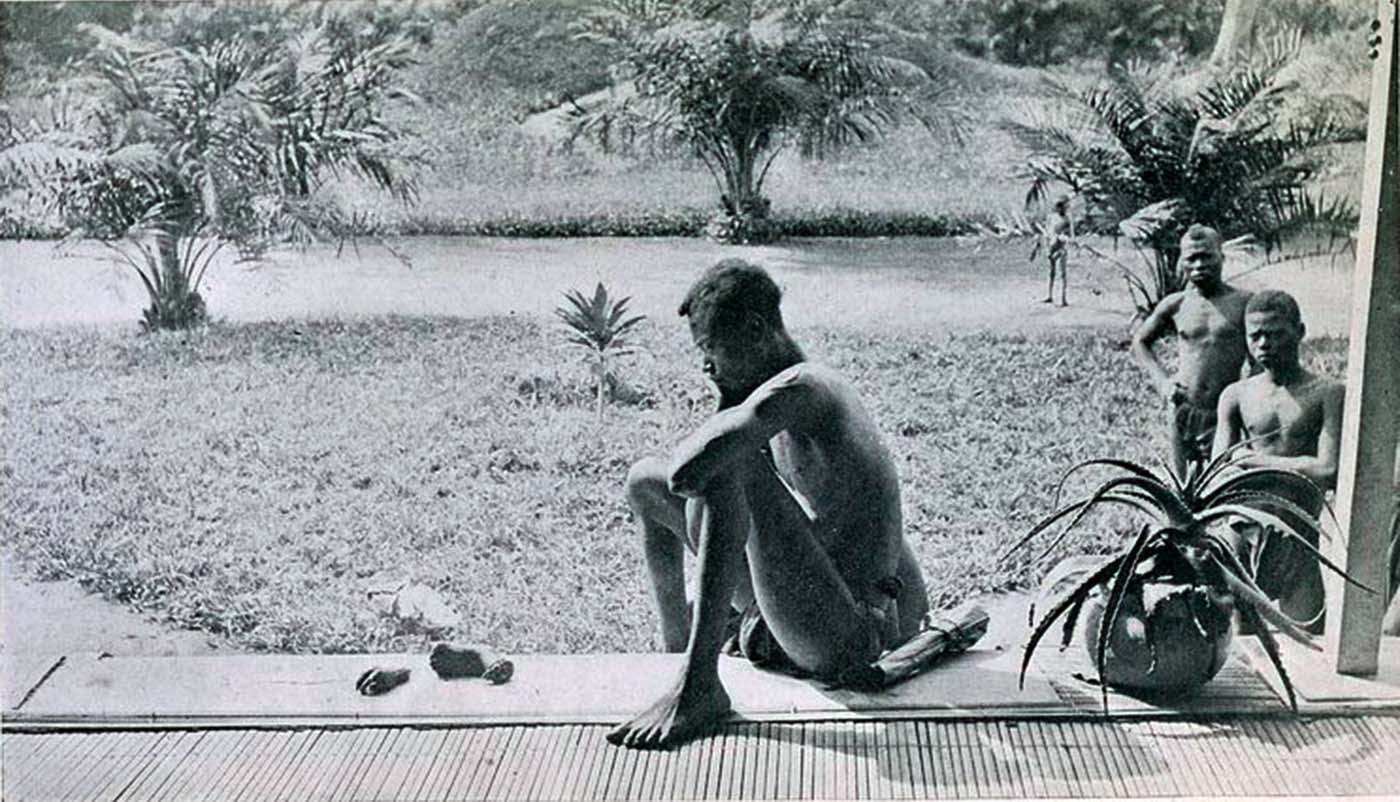] -- .pull-right[ > He hadn't made his rubber quota for the day so the Belgian-appointed overseers had cut off his daughter’s hand and foot. Alice Seeley Harris, _Don't Call Me Lady_ ] ??? --- # Why Torture? .pull-left[ 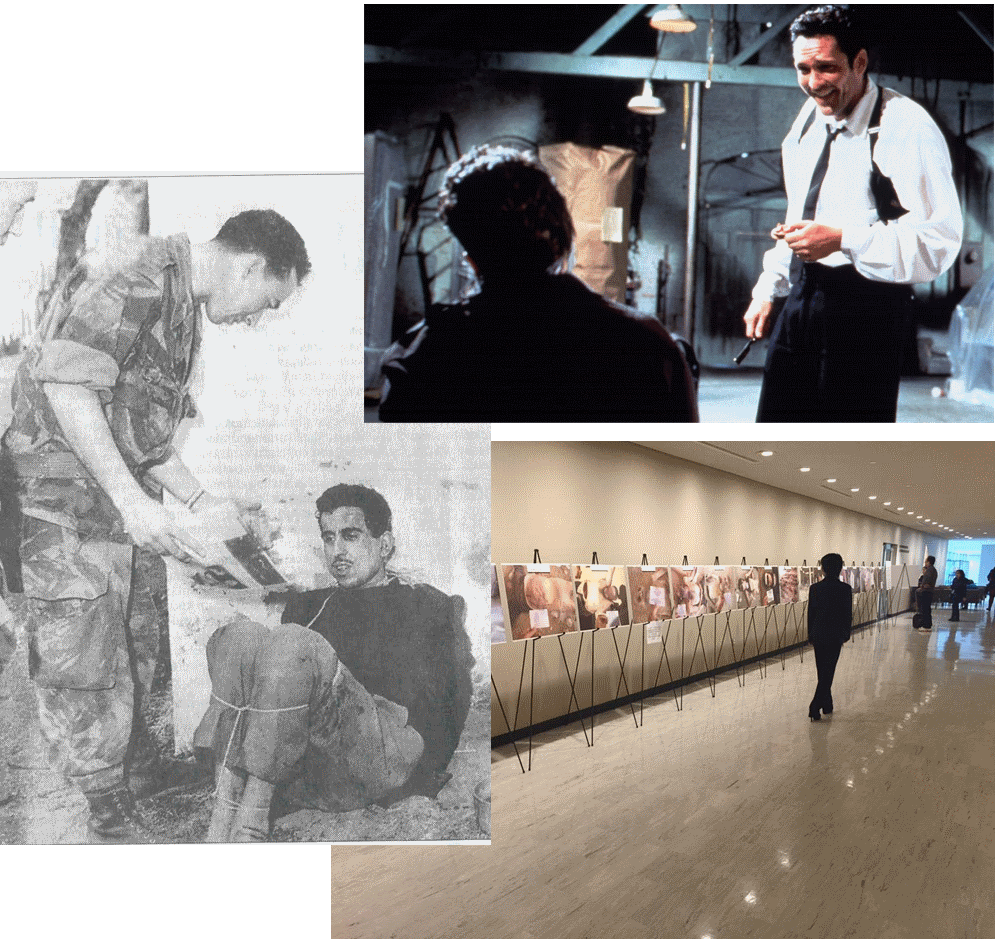 ] .pull-right[ > Torture, pop culture says, is effective, fun, and even funny. Noah Berlatsky, _Torture Is Good_ > The monstrous thing about torture is that sometimes it does work. Charles Krauthammer ] ??? --- # Norms Against Torture (Vietnam) .pull-left[ 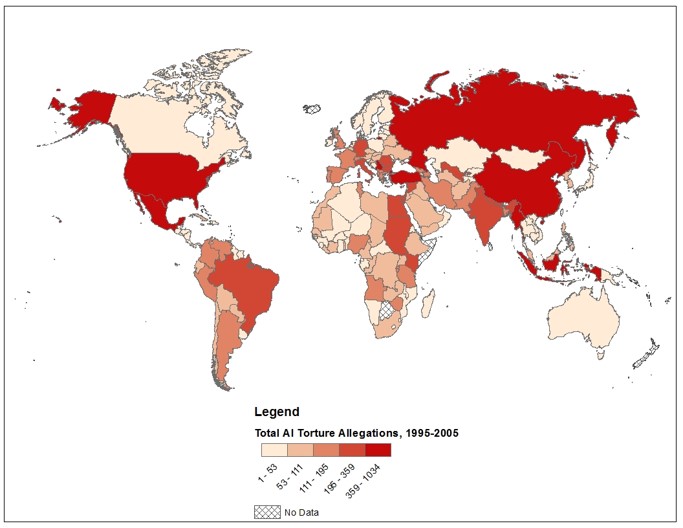 ] .pull-right[ > All our so-called civilisation is covered with a varnish. Scratch it, and underneath you find fear. The French... are not torturers by nature. But when you see the throats of your _copains_ slit, then the varnish disappears. Paul Teitgen ] ??? --- class: inverse # Small Group Discussion .large[ How can you know if torture "works" or not? How would the fact that torture does or does not work alter your opinion regarding the use of torture? ] ??? --- class: inverse # Part 2: The Ticking Time Bomb ??? --- # The Trolley and the Time Bomb .pull-left[ .medium[ Flip a switch -> push a person off a bridge -> torture someone Two forms of certainty at work - Ontological ("This person is a terrorist") - Epistemic ("The bomb will kill 100 people", "I will know where the bomb is if I torture this person") Necessary abstractions & important omissions - Deletion of history/context - Where knowledge comes from ] ] .pull-right[ .picblock[ 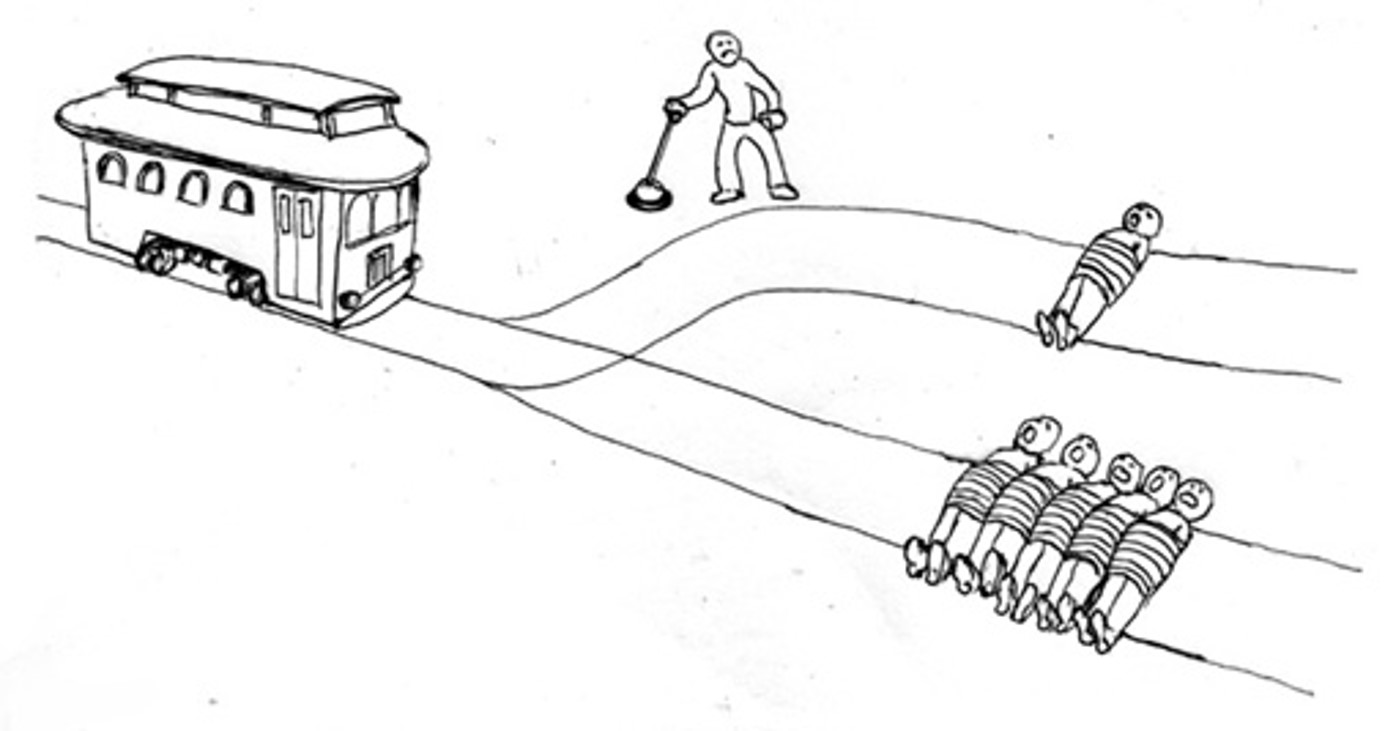  ] ] ??? --- # Liberal Torture .pull-left[  ] .pull-right[ > The ticking time-bomb scenario... makes us see the torturer in a different light... The torturer is instead a conscientious public servant, heroic... willing to do desperate things only because the plight is so desperate and so many innocent lives are weighing on the public servant’s conscience. David Luban ] ??? --- # Institutions and Torture (N.I.) .left-column[ 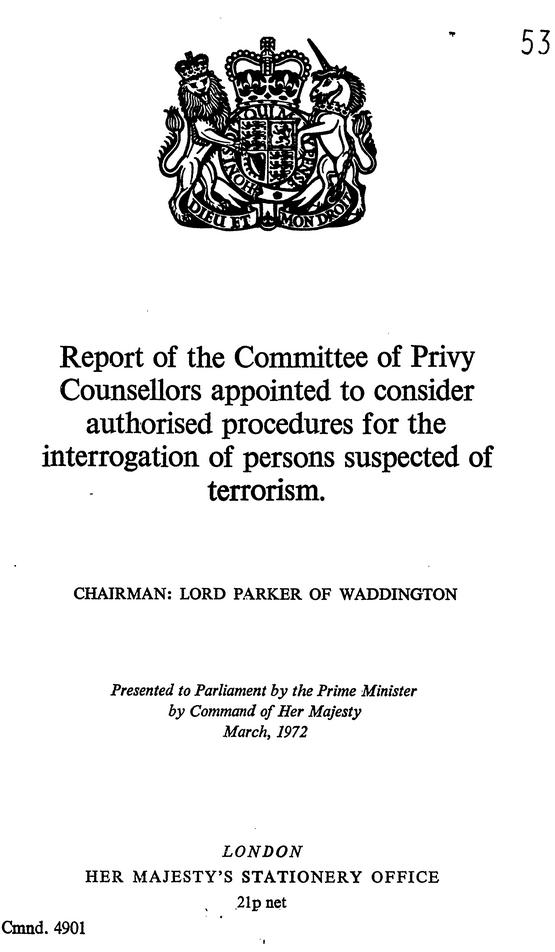  ] .right-column[ > it cannot be assumed that any U.K. Minister has ever had the full nature of these particular techniques brought to his attention, and, consequently, that he has ever specifically authorised their use. Lord Parker, _The Majority Report_ > no Army Directive and no Minister could lawfully or validly have authorised the use of the procedures. Only Parliament can alter the law. The procedures were and are illegal. Lord Gardiner, _The Minority Report_ ] ??? Parker report pp.3, 14 > A pattern that emerged in the evidence, although not universal, was that the legal staff tended to be aware that hooding was prohibited but not aware that it was occurring. Whereas intelligence staff tended to have some awareness that hoods were being used but were not aware that it had been specifically prohibited. > Sir William Gage, _The Report of the Baha Mousa Inquiry_ Baha mousa 1356 --- class: inverse # Small Group Discussion .pull-left[ One proposal for the regulation of torture-for-information is that it should be overseen by judges and courts. ] .pull-right[ .large[ Is a system of "torture warrants" worse than one-off breaches of the prohibition against torture in emergency situations? ] ] ??? --- class: inverse # Part 3: Modern Torture Debates ??? --- # Is Waterboarding Torture? (GWOT) > although the subject may experience the fear or panic associated with the feeling of drowning, the waterboard does not inflict physical pain. J.S. Bybee, _Memo to John Rizzo_ -- > Although the waterboard constitutes a threat of imminent death, prolonged mental harm must nonetheless result to violate the statutory prohibition on infliction of severe mental pain or suffering. J.S. Bybee, _Memo to John Rizzo_ -- > Yes. (Almost) Everyone else ??? --- # Information Derived from Torture .pull-left[ 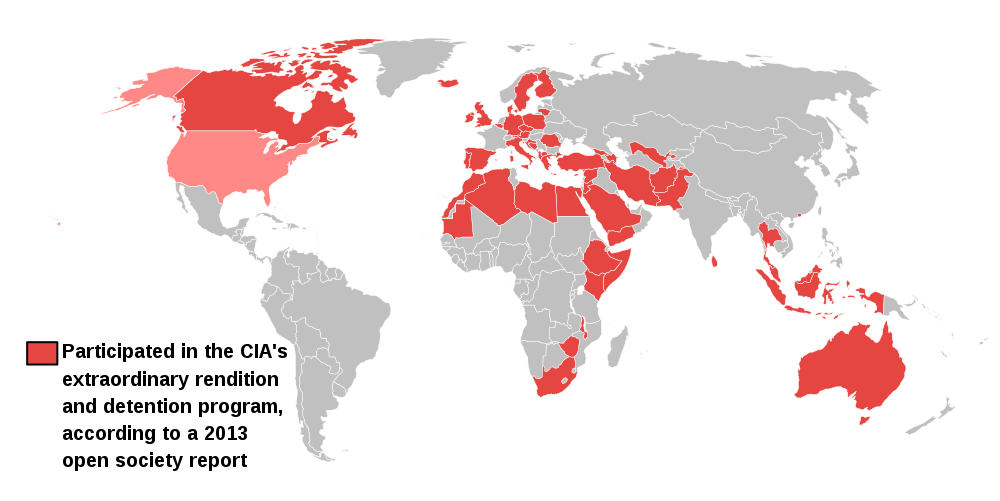 ] .pull-right[ .medium[ > From the primary material we have found 232 cases recorded where it appears that UK personnel continued to supply questions or intelligence to liaison services after they knew or suspected (or, in our view, should have suspected) that a detainee had been or was being mistreated. Intelligence and Security Committee of Parliament, _Detainee Mistreatment and Rendition: 2001–2010_ ] ] ??? --- # The Dark Mirror .left-column[  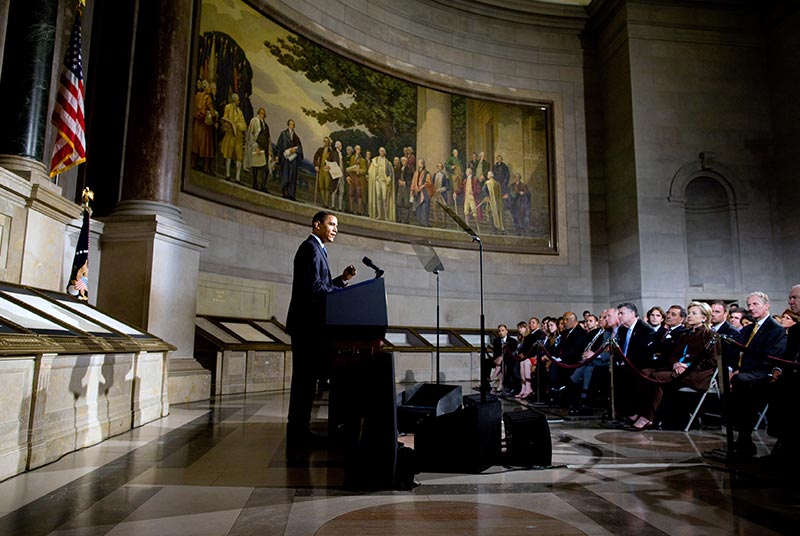  ] .right-column[ > the decisions that were made over the last eight years established an ad hoc legal approach for fighting terrorism that was neither effective nor sustainable-a framework that failed to rely on our legal traditions and time-tested institutions; that failed to use our values as a compass... > I know some have argued that brutal methods like water-boarding were necessary to keep us safe. I could not disagree more. Barack Obama, _Remarks by the President On National Security_ ] ??? --- class: inverse # Small Group Discussion .question[ Should intelligence agencies always ignore information obtained by torture? ] ???